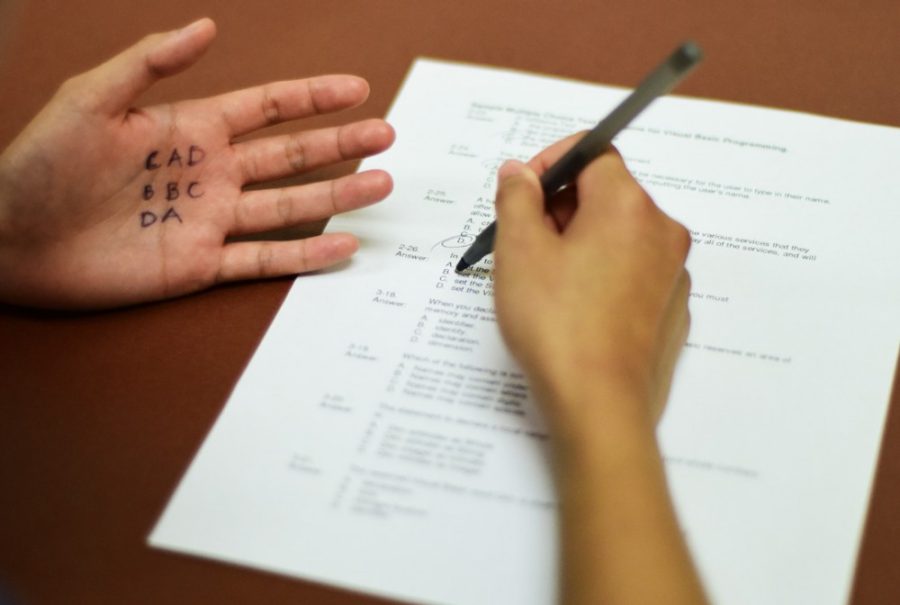With finals week upon us, students and professors alike are preoccupied with the tests, papers and projects that determine the majority of many students’ grades.
This stress will cause some students to cheat, violating the UA’s Code of Academic Integrity.
“Cheating isn’t new; it’s been around forever,” said Chrissy Lieberman, associate dean of students.
Over the past five years, there have been 3,566 violations of the Code of Academic Integrity, according to data from the Dean of Students Office.
The colleges with the top three numbers of violations are the College of Science, with a total of 1,311 violations over the last five years; the college of Social and Behavioral Sciences, with 731; and the College of Humanities, with 655.
Cheating can take many forms, from the classic idea of looking at another student’s test to copying a sentence from Wikipedia.
Plagiarism is overwhelmingly the most common form of academic integrity violation, according to the office of academic integrity at the UA, making up 58 percent of violations for the 2013-2014 school year.
“What that would tell me is we need to spend more time upfront talking about the proper methods for doing research and citations,” said Paul Melendez, professor of practice in management organizations for the Eller College of Management and founder of the Center for Leadership Ethics.
Often, the students found violating the code are freshmen.
“It might be [that] freshmen are more fearful of getting bad grades,” said Aleksander Ellis, Nelson professor of management and the research director for the Center for Leadership Ethics.
Understanding why people cheat
“We really shouldn’t be surprised that students are cheating, given the way that we reward students,” Ellis said.
He points to the reward system the university has for those who achieve high grades.
“We’re rewarding high grades but hoping for knowledge,” Ellis said. “We’re actually creating the structures within the university to promote [cheating].”
Students who receive high grades might not only receive more scholarship opportunities, but graduate school and job opportunities as well.
“When the stakes are high, people are more apt to cheat,” Lieberman said.
Melendez asserted there are three things that are key to understanding how and why people cheat: the individual’s motivation, opportunity and how they rationalize their actions.
“Rationalization is what people do when they know they’re about to do something that’s wrong, but they keep telling themselves, ‘Oh, it’s not that bad,’ or ‘Oh, it’ll be OK,’” Melendez said. “People will rationalize.”
Some ways that students rationalize cheating is by thinking that everyone else is doing it or by thinking of cheating as a way to balance the playing field in a class they consider to be unfair, Melendez said.
Despite steps that some professors take to dissuade cheating through implementing seating charts, having different versions of the test and having proctors, cheating still occurs.
“As a student, you have a lot of opportunity … to cheat,” Melendez said.
Some students can also be caught unaware that they were cheating if they are not familiar with the policies or make a mistake by forgetting to cite a piece of information.
“There’s a problem where a lot of students aren’t aware that what they’re doing is unethical and is actually violating the rules,” Ellis said. “It’s also hard because things are changing so rapidly, and there are all these new options out there to keep up [with] and make sure students are aware what they’re doing is unethical.”
Ellis suggests clear communication from professors with specific examples of what ethical issues a student can run across in a specific class.
All incoming freshmen and transfer students now have to go through the UA Clicks Presentation during orientation, which also includes a section on academic integrity.
However, it may not be the best time to give incoming students information on plagiarism.
“There’s just so much information, too, when you’re first coming that I think if you don’t come here with a strong understanding of what plagiarism is, then it’s just one more thing to manage,” Lieberman said.
International students may also be at a disadvantage when it comes to understanding what is and what isn’t considered cheating.
“In other cultures, this notion of cheating doesn’t necessarily translate,” Melendez said. “What we might call cheating is really called collaborating.”
Repercussions
When a student cheats, a formal action is filed, sanctions are given out and the student is required to attend an academic integrity workshop. If it was a plagiarism violation, they also have to attend a plagiarism awareness workshop.
The sanctions given out depend on the severity of the violation but can range from a warning to expulsion from the university.
“I think that going over the process is very helpful,” said Emily Besich, a graduate assistant in the Dean of Students Office. Besich runs the academic integrity and plagiarism awareness workshops that students are sanctioned to take.
Students with multiple violations are increasing, according to Lieberman, and more students are getting kicked out of their programs.
“If they’re fortunate, they can find another college that’s willing to accept them,” she said, “but the reality is that if you have an interest in a particular course of study and you’re removed for academic integrity violations, there is a real likelihood that your relationship with the university may be in jeopardy.”
However, sometimes professors do not formally file a report with the Dean of Students Office and choose to punish the student informally.
“The formal process that you’re supposed to go through can be very intimidating,” Melendez said.
Melendez explained that some professors choose the informal disciplinary route because they feel the incident can be dealt with inside of the classroom.
“I feel that faculty have an obligation to handle this formally,” Melendez said. “If a professor doesn’t do this diligently, what we end up doing is passing along a problem that can only get larger and larger.”
Differing opinions over the severity of an action can also cause discrepancies over reporting violations.
“Faculty have different levels of tolerance,” Lieberman said. “There is one code of academic integrity, but all of the faculty look at it in a different developmental lens.”
Levels of tolerance for plagiarism may be lower at the UA across the board, however.
“Plagiarism is important to all of our professors, because we’re a research university,” Besich said.
This makes professors especially sensitive to proper citations, according to Besich, because it may be their own work or a colleague’s that a student claims as their own.
“If you’re using a resource that’s not available to the other students in your class, that’s not fair,” Besich said.
This means that using old marked up tests, papers and homework assignments to complete schoolwork or study for tests could be considered a code violation.
_______________
Follow Annie Dickman on Twitter.









